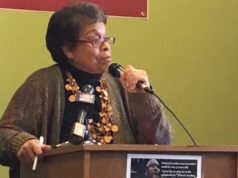 UW-Madison junior Eneale Pickett has started a project called Dear Masculinity for “individuals assigned male at birth and male identifying folks to critically examine their masculinity.” Starting as an online video project, Dear Masculinity will also become a stage production at the Goodman Theatre in Chicago on August 26 at 7 pm.
UW-Madison junior Eneale Pickett has started a project called Dear Masculinity for “individuals assigned male at birth and male identifying folks to critically examine their masculinity.” Starting as an online video project, Dear Masculinity will also become a stage production at the Goodman Theatre in Chicago on August 26 at 7 pm.
Pickett, who stirred controversy by starting an apparel line featuring slogans like “All White People Are Racist,” started Dear Masculinity project in hopes of finding how other male-identifying people define masculinity in their own terms.
He started out the project by asking his friends and colleagues, “If you were able to talk to your masculinity, what would you tell it? If your masculinity was a person, what would you ask it?”
Pickett was influenced by the story of his father, who was shot and killed when Eneale was just three years old. He believes his father died as a result of “hypermasculinity,” the exaggeration of male stereotypical behaviors, such as physical strength, aggression, and sexuality. After coming to the realization that hypermasculinity killed his father, he gathered his thoughts to write a letter to masculinity, even though he knew he wouldn’t get a letter back.
With the help of fellow student Julia Levine, Pickett recorded videos of the students’ letters to masculinity and has been posting a new video every Friday. Each video starts out with someone reading their letters and answering questions relating to why they chose to address the letters the way they did.
The first video posted was from Kenny Jackson, a student from Washington D.C. studying at UW-Madison, who wrote his letter to his father, who he saw masculinity through. Other students in the videos wrote their letters to masculinity itself and told it how it didn’t make their lives easier, but harder.
Dear Masculinity already has almost 50 letters from males writing to their masculinity. Some letters are very emotional. “Some letters are so hard hitting, and so unbelievable,” says Pickett. “Like I had someone in their letter saying ‘Dear Masculinity, why couldn’t I cry at my father’s funeral?’”
Pickett hopes through this project male identifying people realize the dangerous aspects of their masculinity, that they either act upon or exhibit on a daily basis, and how hyper and toxic masculinity can be. Pickett also hopes to influence people in high school and younger children.
“I wanna influence younger people, like people still in high school and younger children, because they’re the new generation,” he says. “It’s hard to get older people to change. When you’re younger, you’re so impressionable, like it’s a lot of things you can get. We see on television, we are spoonfed white supremacy, we are spoonfed beauty standards, we are spoonfed false history and false truth that this nation is built upon, so why not give you the truth about what masculinity is and what hypermasculinity can do to you?”
Pickett also wants to teach younger people that it’s okay to cry, to show weakness, and ask for help. Pickett himself admits that he has trouble dealing with masculinity, even though he’s aware of how toxic it can be. He still has a hard time expressing himself, not keeping things in, and sometimes even “either the high way if not my way.” He used his own life experiences to come up with a way for others to talk about their perspective on masculinity.
Anyone can submit their letters of 300-500 words to masculinity at [email protected].
This piece was produced by a student reporter in the Madison365 Academy. To learn more and support our education programs, visit madison365.org/academy.










